calsfoundation@cals.org
Blanche Meyers Lambert Lincoln (1960–)
Blanche Meyers Lambert Lincoln was a United States senator whose career was marked by firsts and by a desire for bipartisanship. She was the first woman elected to the U.S. Senate from Arkansas since Hattie W. Caraway in 1932, the youngest woman elected to the Senate, and was mentioned as a possible running mate for Democratic presidential candidate John Kerry in the 2004 election.
Blanche Meyers Lambert was born on September 30, 1960, in Helena (Phillips County), hailing from a seventh-generation Arkansas farm family that grew rice, wheat, soybeans, and cotton. Her parents were Jordan Lambert Jr., a farmer, and Martha Kelly Lambert, a homemaker. She attended Helena public schools, and her first elective office was president of the Helena Central High School Student Council in 1977–78.
After high school graduation in 1978, she briefly attended the University of Arkansas (UA) in Fayetteville (Washington County). There, she was a member of Chi Omega fraternity for women, which had been founded in 1895 at UA. She later transferred to Randolph-Macon Woman’s College in Lynchburg, Virginia. In 1982, she received a bachelor’s degree in biology from Randolph-Macon.
She moved to Washington DC, where she served as staff assistant to Arkansas’s First District congressman, Bill Alexander, from 1982 to 1984, later working as a lobbyist. In 1992, she returned to Arkansas to challenge Alexander, who had received unfavorable publicity in a House banking scandal.
She won the 1992 congressional election, becoming the first woman to represent Arkansas’s First District. In August 1993, she married Dr. Steve Lincoln, who practiced medicine in Fairfax, Virginia. She was reelected in 1994, serving through 1997, but did not run in the next election as she was expecting twin boys, Reece and Bennett.
When Dale Bumpers announced his retirement from the U.S. Senate in 1998, Lincoln decided to run for the seat. On November 3, 1998, she became the youngest woman ever elected to the Senate. When she was sworn in on January 6, 1999, she became Arkansas’s thirty-second senator, following in the footsteps of Arkansas’s only other female senator, Hattie W. Caraway, who served from 1932 to 1944.
Beginning with her first congressional term, she called herself a member of the Blue Dog Coalition, a group of moderate Democrats seeking a spirit of bipartisanship and innovative problem-solving. She was a founding co-chair of a group called Third Way, seeking new ways to approach traditional problems. She was reelected to the Senate from Arkansas in 2004, receiving more than half a million votes, the highest total cast for any senatorial candidate in state history.
In January 2001, she was appointed by the Democratic Party leadership to be a member of the Senate Finance Committee; only two other women and four other Arkansans in history had served in that powerful group. She served on the Agriculture, Nutrition and Forestry Committee and the Rural Health Caucus, the Special Committee on Aging, the Select Committee on Ethics, and the Social Security Task Force. She was founder and chairwoman of the Senate Hunger Caucus, serving Americans who do not have enough food. Lincoln was called an up-and-coming member of the Senate and an energetic campaigner with an engaging personality. The Washington Post named her a possible running mate for John Kerry in the 2004 presidential election.
In her legislative career, she paid special attention to issues involving working families, veterans, farmers, and rural concerns, reflecting her upbringing on an Arkansas farm in a region that has traditionally been mired in poverty. She was an advocate of the Delta Regional Authority, designed to stimulate development in the lower Mississippi Delta.
Her legislative initiatives included securing millions of dollars for Arkansas’s military installations, grants to Arkansas law enforcement agencies through the Department of Justice’s Bulletproof Vest Program, amending the IRS Code for repeal of the estate tax on family-owned businesses and farms, expansion of the Social Security Act to expand coverage to pregnant women, a state children’s health insurance program, a bill to protect children from Internet pornography, funding to combat and clean up methamphetamine labs, emergency assistance to farmers suffering losses due to natural disasters such as Hurricane Katrina, and temporary Medicaid disaster relief for survivors of Hurricane Katrina.
She was a contributing author for the book Nine and Counting: The Women of the Senate (2000), which profiled women in the U.S. Senate. When it was published, there were nine women in the Senate. When the paperback edition was released in 2001, there were thirteen. She has served on the boards of University of Arkansas Medical Sciences Foundation, the March of Dimes, Arkansas Easter Seals, and the American Red Cross. An avid hunter and angler, she was named the National Sportfishing Association’s 1996 Woman of the Year.
She is known for a sound list of accomplishments, a willingness to seek bipartisan solutions, and loyalty to the state’s people and values. She once said, “I am not normally a betting person, but I say that putting your money on the American people is about as close to a sure bet as you are going to get.”
In the November 2010 mid-term election, Lincoln lost her Senate seat to Republican John Boozman. She had narrowly won the primary over Lieutenant Governor Bill Halter but was not able to find enough support after losing union backing and failing to satisfy critics on both the left and right of the political spectrum.
In January 2011, Entergy Corp. announced that Lincoln would serve on its board of directors; that same year, she became a special policy advisor with the legal firm of Alston & Bird LLP. In 2013, she started her own lobbying firm, the Lincoln Policy Group. The publication The Hill put her on its list of the top lobbyists of 2014.
For additional information:
“Blanche Lambert Lincoln.” Biographical Directory of the United States Congress. http://bioguide.congress.gov/scripts/biodisplay.pl?index=l000035 (accessed July 1, 2021).
Mikulski, Barbara, et al. Nine and Counting: The Women of the Senate. New York: William Morrow & Co., 2000.
Nancy Hendricks
Arkansas State University
 Divergent Prosperity and the Arc of Reform, 1968–2022
Divergent Prosperity and the Arc of Reform, 1968–2022 Politics and Government
Politics and Government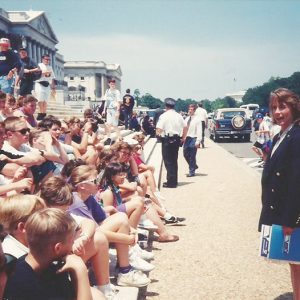 Lincoln with Students
Lincoln with Students 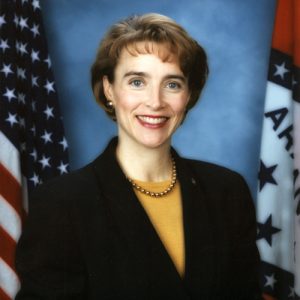 Blanche Lincoln
Blanche Lincoln 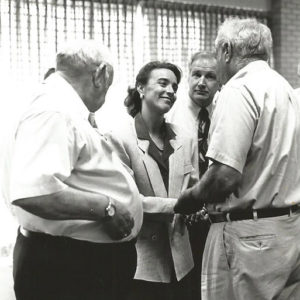 Blanche Lincoln
Blanche Lincoln 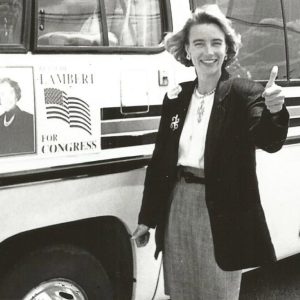 Blanche Lincoln
Blanche Lincoln 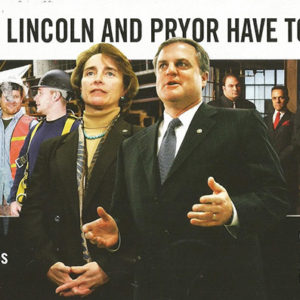 Anti–Lincoln and Pryor Ad
Anti–Lincoln and Pryor Ad  Blanche Lincoln
Blanche Lincoln 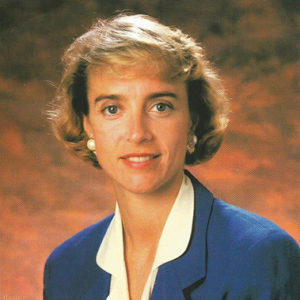 Blanche Lambert Campaign
Blanche Lambert Campaign 




An excellent read for young women and all Arkansas students who wonder what the future holds for them. I’m 89 and served South Arkansas’s Union County in the Arkansas House during Governor Rockefeller’s administration. We young Democrats supported the progressive agenda of the governor. The results during that four years disappointed Republicans, but we did a good job of advancing Arkansas to the results we enjoy today. It was a very successful beginning. I was a local start-up attorney in El Dorado, Union County, AR, and active as a Week End Warrior in the Naval Air Reserve at Memphis and Dallas Naval Air Stations. Arkansas began to get it right with Gov. Dale Bumpers. We are a beautiful-progressive State. I also thank Fulbright and Oren Harris as the glue that set the stage for a Modern Arkansas.